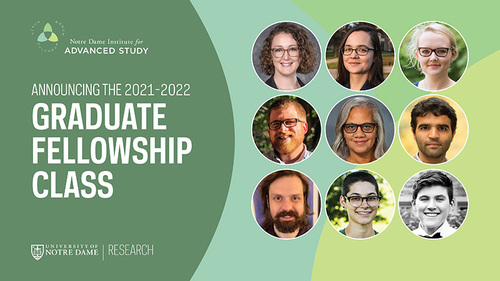
The Notre Dame Institute for Advanced Study (NDIAS) has selected nine Notre Dame doctoral students for its newly formed Distinguished Graduate Fellowship Program. The students were selected through a competitive application and interview process and were chosen on the basis of their research promise, interdisciplinary potential, collaborative commitment and fit with the NDIAS’ mission and research theme.
“These nine doctoral candidates reflect the extraordinary talent and diversity of graduate researchers at Notre Dame,” said Meghan Sullivan, director of the NDIAS and the Wilsey Family College Professor of Philosophy. “We anticipate ambitious, mutually strengthening work from this team in the coming school year, and we are so grateful for the opportunity to welcome them into the busy life of the institute. They each bring provocative research ideas, proven records of accomplishment and a vision to help us all understand and build more resilient systems.”
Each of the graduate fellows is conducting a substantial research project related to resilience, the NDIAS’ organizing research theme for the 2021-22 school year. Two of the fellows are co-sponsored by the Notre Dame Technology Ethics Center (ND-TEC) and are pursuing research projects that engage with questions related to the ethical use of technology.
“ND-TEC is thrilled to collaborate, once again, with the NDIAS to support early career researchers with expertise in technology ethics,” said Mark McKenna, director of ND-TEC and the John P. Murphy Foundation Professor of Law. “It has always been our goal at ND-TEC to help train the next generation of critical thinkers about technology, and this is a terrific opportunity to do that. We’re very excited to co-sponsor two graduate fellows next year and look forward to their contributions to ND-TEC.”
The 2021-22 distinguished graduate fellows are:
- Brian Boyd, Department of Theology, “Full Equality in Exchange: A renewed theory of just wage,” co-sponsored by ND-TEC
- Char Brecevic, Department of Philosophy, “Patient Nonadherence: Imagining a way forward,” co-sponsored by ND-TEC
- Claudia Carroll, Department of English, “Why Characters Feel Real: Representations of consciousness in the 19th-century novel”
- Kristin Haas, Department of Theology, “The Ecological Significance of Louis Bouyer’s Historical and Eschatological Theology”
- Jake McGinnis, Department of English, “Disturbance Ecologies: Antebellum American travel literature and contemporary environmental nonfiction”
- Shana Scogin, Department of Political Science, “Rebuilding the Foundations: Community politics of reconstruction in post-earthquake Nepal”
- Claire Scott-Bacon, Department of Psychology, “Autistic Psychopathy: Size and specificity between psychopathy, autism, and criminal responsibility”
- Khan Asfandyar Shairani, Department of History, “Renewing Muslim Knowledge Traditions: The search for authenticity in 18th-century Ottoman and Mughal empires”
- Alyssa Willson, Department of Biological Sciences, “The Ecological Time Machine: Investigating the past and present to improve ecological forecasts”
Graduate fellows receive $30,000 stipends along with $1,000 of research support.
Throughout the year, the graduate fellows will work alongside the NDIAS’ residential faculty fellows and participate in the institute’s yearly academic programming, including its annual presentation and writing retreats, weekly research seminars, conferences and public outreach events. Graduate fellows also have the opportunity to engage in research and career mentorships with institute faculty, staff and campus partners.
The Distinguished Graduate Fellowship Program is made possible with support from Michael Wilsey (’65), who helped fund the pilot program for doctorate students in the College of Arts and Letters. The graduate fellow from the College of Science is supported by Associate Professor Jason McLachlan, who also joins the institute as a 2021-22 faculty fellow.
More information about the fellowship class can be found at ndias.nd.edu/gradfellows-2021-2022.
The NDIAS convenes an interdisciplinary group of faculty fellows, top doctoral candidates and undergraduate scholars to study questions that require a joint focus, benefit from sustained research and discussion and advance our understanding of core issues that affect our ability to lead valuable, meaningful lives. To learn more, visit ndias.nd.edu.
Contact: Maria Di Pasquale, associate director, Notre Dame Institute for Advanced Study, mdipasqu@nd.edu, 574-631-3770; @NotreDameIAS
Originally published by at ndias.nd.edu on April 29.